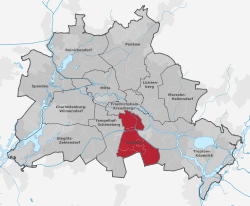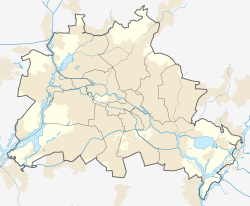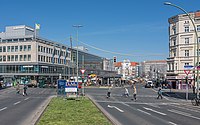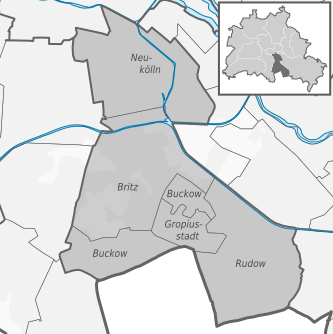Borough of Berlin in Germany
| Neukölln | |
|---|---|
| Borough of Berlin | |
 Flag Flag Coat of arms Coat of arms | |
Location of Neukölln in Berlin
 | |
  | |
| Coordinates: 52°29′N 13°27′E / 52.483°N 13.450°E / 52.483; 13.450 | |
| Country | Germany |
| State | Berlin |
| City | Berlin |
| Subdivisions | 5 localities |
| Government | |
| • Borough Mayor | Martin Hikel (SPD) |
| Area | |
| • Total | 44.93 km (17.35 sq mi) |
| Population | |
| • Total | 330,017 |
| • Density | 7,300/km (19,000/sq mi) |
| Time zone | UTC+01:00 (CET) |
| • Summer (DST) | UTC+02:00 (CEST) |
| Vehicle registration | B |
| Website | Official homepage |
Neukölln (German: [nɔʏˈkœln] ) is one of the twelve boroughs of Berlin, Germany. It is located south of Berlin's centre and stretches southeastwards to the city boundary, encompassing the localities of Neukölln, Britz, Buckow, Rudow and Gropiusstadt.
Neukölln borough was part of the American sector during the Four-Power occupation of the city. It is characterised by having one of the highest percentages of immigrant residents in Berlin. An influx of students and artists since the mid-2000s has led to gentrification.
History

The Berlin district of Neukölln has a long and varied history that reflects the city's changing political and cultural landscape.
Located in the south of the city, Neukölln was originally a small village on the outskirts of Berlin. Neukölln's independence ended on 1 October 1920 when it was incorporated into Berlin. During the German revolution it was the centre of a soldier and worker's council which controlled all local government departments, abolished the municipal authorities, took over the banks and declared housing to be communal property.
In September 1929, Goebbels led his men into Neukölln, a KPD stronghold, and the two warring parties exchanged pistol and revolver fire. During World War II, Neukölln was the location of a subcamp of the Sachsenhausen concentration camp for Jewish and Romani women.
After World War II, Neukölln underwent significant transformation as a result of the city's division by the Berlin Wall. The neighborhood was located in West Berlin and became a center of industry and commerce, with many factories and warehouses. From 1966 to 1975 the Gropiusstadt was built, a "Trabantenstadt" or city-within-a-city housing estate, designed by architect Walter Gropius. In the 1980s and 1990s, Neukölln underwent a process of gentrification, with many artists, students, and young professionals moving into the area. In recent years, Neukölln has become known for its diverse and vibrant cultural scene, with a mix of traditional and alternative businesses and a thriving arts and music scene.
Today, Neukölln is a popular destination for tourists and locals alike, with a diverse array of restaurants, cafes, and shops, as well as a number of cultural attractions and events. Despite its gentrification, Neukölln remains a working-class neighborhood with a diverse and multicultural population.
Locality subdivisions
 Hufeisensiedlung, 2017
Hufeisensiedlung, 2017 Britzer Garten in Neukölln's South
Britzer Garten in Neukölln's South
Neukölln is subdivided into five localities:
| Locality |
Area (km) |
Inhabitants |
Density (Inhabitants/km) |
|---|---|---|---|
| 0801 Neukölln |
11.71 | 155,950 | 13,318 |
| 0802 Britz |
12.40 | 39,029 | 3,148 |
| 0803 Buckow |
6.35 | 38,219 | 6,019 |
| 0804 Rudow |
11.81 | 40,733 | 3,449 |
| 0805 Gropiusstadt |
2.67 | 35,751 | 13,390 |
Public transport



Neukölln is served by three operational sections of urban rail.
- U7: Rathaus Spandau ↔ Rudow (running northwest–southeast)
- U8: Wittenau ↔ Hermannstraße (running north–south)
Part of each of the following S-Bahn routes share an east–west-running section of Ringbahn track through Neukölln:
- S41/S42: Südkreuz → Gesundbrunnen → Südkreuz (clockwise ↔ anti clockwise circular)
- S45: Südkreuz ↔ Berlin Schönefeld Flughafen (only from Monday till Friday). An extension of the S45 is projected to run beyond the current terminus at Schönefeld Airport to the under construction Berlin Brandenburg Airport.
- S46: Westend ↔ Königs Wusterhausen
- S47: Spindlersfeld ↔ Hermannstraße
Among the numerous rail stations in Neukölln three act as interchanges:
- Hermannplatz - U7 / U8
- Hermannstraße - U8 / S-Bahn
- Berlin-Neukölln - U7 / S-bahn
Demographics
As of 2010, the borough had a population of 310,283, of whom 121,000 (38.9%) were of non-German ethnicity. The percentage is significantly higher in the locality of the same name, Neukölln. The borough is known for its large Turkish, Arab and Kurdish communities, which together make up roughly 18% of the borough's population. Recently, there has been an influx of Romani people and Sub-Saharan Africans.
| Population by migration background | |
|---|---|
| Ethnic Germans | 60% (189,000) |
| Middle Eastern origin | 18% (55,000) |
| non-German European origin | 11% (33,000) |
| Afro-Germans | 4% (12,400) |
| Others (East Asians, Americans, etc.) | 6.5% (21,000) |
Gentrification
A trend is the rapid gentrification of certain neighbourhoods within the borough. There has been an influx of students, creatives and other young professionals of mostly Western origin avoiding higher rents which are charged in other parts of Berlin. This has caused a knock-on effect, with rents rising in some parts of Neukölln. Northern Neukölln, just to the south of the Kreuzberg area, has become informally referred to as "Kreuzkölln" as the area becomes increasingly fashionable.
Politics
District council
The governing body of Neukölln is the district council (Bezirksverordnetenversammlung). It has responsibility for passing laws and electing the city government, including the mayor. The most recent district council election was held on 26 September 2021, and the results were as follows:
| Party | Lead candidate | Votes | % | +/- | Seats | +/- | |
|---|---|---|---|---|---|---|---|
| Social Democratic Party (SPD) | Martin Hikel | 41,104 | 28.7 | 18 | |||
| Alliance 90/The Greens (Grüne) | Susann Worschech | 25,238 | 17.6 | 11 | |||
| Christian Democratic Union (CDU) | Falko Liecke | 24,191 | 16.9 | 10 | ±0 | ||
| The Left (LINKE) | Sarah Nagel | 21,525 | 15.0 | 9 | |||
| Alternative for Germany (AfD) | Julian Potthast | 10,125 | 7.1 | 4 | |||
| Free Democratic Party (FDP) | Roland Leppek | 6,971 | 4.9 | 3 | |||
| Tierschutzpartei | 4,101 | 2.9 | 0 | ±0 | |||
| Die PARTEI | 2,909 | 2.0 | 0 | ±0 | |||
| dieBasis | 1,787 | 1.2 | New | 0 | New | ||
| Klimaliste | 1,451 | 1.0 | New | 0 | New | ||
| Volt Germany | 1,431 | 1.0 | New | 0 | New | ||
| Free Voters | 1,061 | 0.7 | New | 0 | New | ||
| We are Berlin | 843 | 0.6 | New | 0 | New | ||
| Ecological Democratic Party | 235 | 0.2 | New | 0 | New | ||
| Liberal Conservative Reformers | 192 | 0.1 | New | 0 | New | ||
| Valid votes | 143,164 | 98.9 | |||||
| Invalid votes | 1,655 | 1.1 | |||||
| Total | 144,819 | 100.0 | 55 | ±0 | |||
| Electorate/voter turnout | 225,767 | 64.1 | |||||
| Source: Elections Berlin | |||||||
District government
The district mayor (Bezirksbürgermeister) is elected by the Bezirksverordnetenversammlung, and positions in the district government (Bezirksamt) are apportioned based on party strength. Martin Hikel of the SPD was elected mayor on 21 March 2018. Since the 2021 municipal elections, the composition of the district government is as follows:
| Councillor | Party | Portfolio | |
|---|---|---|---|
| Martin Hikel | SPD | District Mayor Civil Service and Logistics | |
| Jochen Biedermann | GRÜNE | Deputy Mayor Urban Development, Environment and Traffic | |
| Falko Liecke | CDU | Social Affairs | |
| Karin Korte | SPD | Education, Culture and Sport | |
| Mirjam Blumenthal | SPD | Youth and Health | |
| Sarah Nagel | LINKE | Public Order | |
| Source: Berlin.de | |||
Notable people



- Edgar Froese (1944–2015), musician, founder of the electronic music group Tangerine Dream
- Leo Arons (1860–1919), physicist, social democrat and supporter of the trade union movement
- Sebastian Blomberg (born 1972), actor
- Horst Buchholz (1933–2003), actor
- Heinz Buschkowsky (born 1948), politician (SPD), former district mayor of Neukölln
- Christiane F. (born 1962), author of the book Wir Kinder vom Bahnhof Zoo
- Ursula Goetze, anti-Nazi activist (1916–1943)
- Alexander Hacke, musician, born 1965 in Neukölln
- Kirsten Heisig (1961–2010), juvenile magistrate in Neukölln, created the Neuköllner Modell, applying rapid intervention procedures to deal with juvenile offenders before they embarked on a criminal lifestyle
- Kurt Krömer (born 1974), presenter, actor and entertainer
- Jutta Limbach (1934–2016), legal academic
- Will Meisel (1897–1967), composer and publisher
- Inge Meysel (1910–2004), actress
- Gunnar Möller (1928–2017), actor
- Mady Rahl (1915–2009), actress
- Antonio Rüdiger (born 1993), footballer
- Werner Seelenbinder (1904–1944), wrestler, politician (KPD) and resistance fighter
- Katharina Szelinski-Singer (1918–2010), sculptor
- Elsa Thiemann (1910–1981), Bauhaus educated photographer, who took many photographs of Neukölln where she lived
- Lotte Ulbricht (1903–2002), wife of East German leader Walter Ulbricht
- Emil Wutzky (1871–1963), trade unionist and local politician (SPD)
- Engelbert Zaschka (1895–1955), inventor and helicopter pioneer
- Alice Phoebe Lou (born 1993), a South African singer-songwriter
In popular culture
| This section needs additional citations for verification. Please help improve this article by adding citations to reliable sources in this section. Unsourced material may be challenged and removed. (June 2014) (Learn how and when to remove this message) |
- "Neuköln" (deliberately spelt with one 'l') is an instrumental piece by David Bowie, the ninth track on his 1977 album "Heroes".
- The last track of Miss Kittin's first solo album I Com is called "Neukölln 2".
- The German film Knallhart is set in the northern part of Neukölln.
- The German documentary Neukölln Unlimited tells the story of three Lebanese teenagers based in Neukölln, who fight their deportation out of Germany.
- Electronic music producer Kobosil is a native of the city. With a Bachelor of Arts in audio production, he has released music on the Ostgut Ton and MDT labels.
- The series 4 Blocks is set in Neukölln and Kreuzberg.
- The sixth leg of The Amazing Race 32 had its Pit Stop in Neukölln.
Twin towns – sister cities
See also: List of twin towns and sister cities in GermanyNeukölln is twinned with:
 Anderlecht, Belgium (1955)
Anderlecht, Belgium (1955) Bat Yam, Israel (1978)
Bat Yam, Israel (1978) Boulogne-Billancourt, France (1955)
Boulogne-Billancourt, France (1955) Çiğli (İzmir), Turkey (2005)
Çiğli (İzmir), Turkey (2005) Cologne, Germany (1967)
Cologne, Germany (1967) Hammersmith and Fulham (London), England, United Kingdom (1955)
Hammersmith and Fulham (London), England, United Kingdom (1955) Leonberg, Germany (1970)
Leonberg, Germany (1970) Marino, Italy (1980)
Marino, Italy (1980) Pavlovsk (Saint Petersburg), Russia (1991)
Pavlovsk (Saint Petersburg), Russia (1991) Prague 5 (Prague), Czech Republic (2005)
Prague 5 (Prague), Czech Republic (2005) Pushkin (Saint Petersburg), Russia (1991)
Pushkin (Saint Petersburg), Russia (1991) Ústí nad Orlicí, Czech Republic (1989)
Ústí nad Orlicí, Czech Republic (1989) Wetzlar, Germany (1959)
Wetzlar, Germany (1959) Zaanstad, Netherlands (1955)
Zaanstad, Netherlands (1955)
Gallery
-
 County Court
County Court
-
 City hall
City hall
-
 Buddy Bear Neukölln in front of the City hall
Buddy Bear Neukölln in front of the City hall
-
 Landwehrkanal
Landwehrkanal
-
 Border crossing at Sonnenallee, 1964
Border crossing at Sonnenallee, 1964
-
 Stadtbad Neukölln
Stadtbad Neukölln
See also
References
- "Einwohnerinnen und Einwohner im Land Berlin am 31. Dezember 2023". Amt für Statistik Berlin-Brandenburg. February 2024.
- Translated "New Cölln", and etymologically "New Colony" from lat. colonia.
- ^ Mendoza, Moises (11 March 2011). "Neukölln Nasties: Foreigners Feel Accused in Berlin Gentrification Row". Der Spiegel.
- "1920: A Crisis Year". Unvollendete Metropole. Retrieved 7 September 2021.
- Gluckstein, Donny (1985). Western soviets. Bookmarks Publishing Co-operative. p. 133.
- Megargee, Geoffrey P. (2009). The United States Holocaust Memorial Museum Encyclopedia of Camps and Ghettos 1933–1945. Volume I. Indiana University Press, United States Holocaust Memorial Museum. p. 1279. ISBN 978-0-253-35328-3.
- S41 "Bahnhofs- und Linieninformationssystem" s-bahn-berlin.de accessed 19 March 2018
- S42 "Bahnhofs- und Linieninformationssystem" s-bahn-berlin.de accessed 19 March 2018
- S45 "Bahnhofs- und Linieninformationssystem" s-bahn-berlin.de accessed 91 march 2018
- "2020 vision for Berlin's long-overdue Brandenburg Airport" Travel weekly, 9 January 2018
- S45 "Bahnhofs- und Linieninformationssystem" s-bahn-berlin.de accessed 19 March 2018
- S47 "Bahnhofs- und Linieninformationssystem" s-bahn-berlin.de accessed 19 March 2018
- "Seite wird geladen" (PDF).
- Peters, Freia (28 September 2010). "Die Roma von Berlin-Neukölln". Die Welt.
- "Seite wird geladen" (PDF). www.statistik-berlin-brandenburg.de. Archived from the original (PDF) on 30 August 2021. Retrieved 22 May 2022.
- "Sagt endlich Kreuzkölln!" 12 April 2016 Der Tagesspiegel
- Roma, A. S. (9 June 2016). "Antonio Rudiger: This is the story of my life". forza roma. Retrieved 17 July 2017.
- "Kobosil". Resident Advisor. Resident Advisor Ltd. 2014. Retrieved 4 June 2014.
- Turano, Sammi (18 November 2020). "The Amazing Race Recap for 11/18/2020: Double Legs". TV Grapevive. Retrieved 19 November 2020.
- "Neuköllner Städtepartnerschaften". berlin.de (in German). Berlin. 10 November 2020. Retrieved 8 February 2021.
External links
- (in German) Official homepage
- (in German) WebTV from Berlin, Neukoelln
| Boroughs and quarters of Berlin | |
|---|---|
| Boroughs of Berlin (1920–2000) | ||
|---|---|---|
| West boroughs (1920–2000) |  | |
| East boroughs (1920–2000) |
| |
